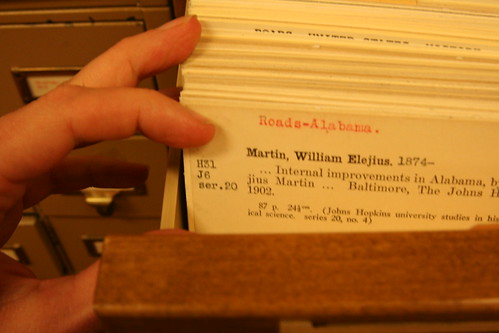
Web 2.0 requires public visibility and interoperability with other web tools, in order that a searching aid should be found, adopted, and rendered relevant to the new research paradigms being adopted by scholars and members of the public alike. The more journals fit themselves into this paradigm, the better they'll thrive in the new order, finding readers both academic and para-academic as allies. They will function usefully as finding-aids for the most relevant, expert material in their disciplines.
In going web 2.0, journals have the ability to mesh their publications with tools that will allow readers to better integrate journal essays with the rest of their research. A scholar using zotero and jstor can download the article pdf and the citation, ready for use in footnote. Web 2.0 journals will go further into this zone: a scholar using zotero, jstor, google scholar, and delicious can instantaneously find other scholars' opinions of a particular article, the names of the disciplines and sub-disciplines they think it applies to best, and other articles of similar note to that particular scholar.
1.a) With these tools, every published article becomes easily interfaced with the tools new scholars are using to sort their data.
For example:, if you look at http://delicious.com/bibliparis4/revues you will find some sources of reviews recommended by the French librarian who holds that account. When I'm signed into delicious as joguldi, I have the option to save any of these citations from the list into my own account. Each visitor can refashion their own micro-reading-list from their colleagues' reading-lists, cutting and pasting collective knowledge into an individual canon suited to their own project.
1.b) The promise of resilience: continued relevance to changing research patterns.
The web 2.0 journal will encourage this kind of interface, working within technologies for co-tagging, sharing lists, and making-one's-own-list. In so doing, the web 2.0 journal will become intimately interfaced with scholars' processes of research, reading, and writing, remaining an indispensable part of scholarship in the next era of research. They will avoid the possible irrelevance to reading processes, subdisciplinary conversations on mailing lists/delicious/twitter, and other forms of scholarly information-sharing that are coming to predominate in the life of the digital scholar.
1.c) The need for permanence.
Web 2.0 journals must insure that some copy of whatever material they publish is backed up for posterity. They may rely upon a public, collaborative site such as archive.org for those purposes.
1.d) Real interoperability.
It is strongly desirable to use a public, widely-adopted instrument such as delicious or librarything, already equipped with full tagging, user interoperability, and visibility before the public, rather than one of the new, unstable, invite-only micro-communities for information sharing like academiacommons or scribd.
---
For the next week, we're offering some tentative principles for rethinking journals by way of sparking conversation. At first, they'll take the form of blog entries like this one. We welcome your reactions -- especially sets of alternative principles or concerns that may have been overlooked. At the end of the week, we'll be integrating the original principles with your comments into a wiki. Wikis, as you probably know from wikipedia, are pretty good at synthesizing the opinion of a group. They're also not much harder to use than Microsoft Word. The wiki will form an evolving, multi-authored document that will have some permanence and the ability to slow-evolve to reflect the diversity of concerns and strategies on the table. The responses you offer here, the wiki, and the long-term conversation will, we hope, produce a useful overview of the diversity of opinions, offering a substantial statement on the profession for use when the CELJ next convenes live.
No comments:
Post a Comment